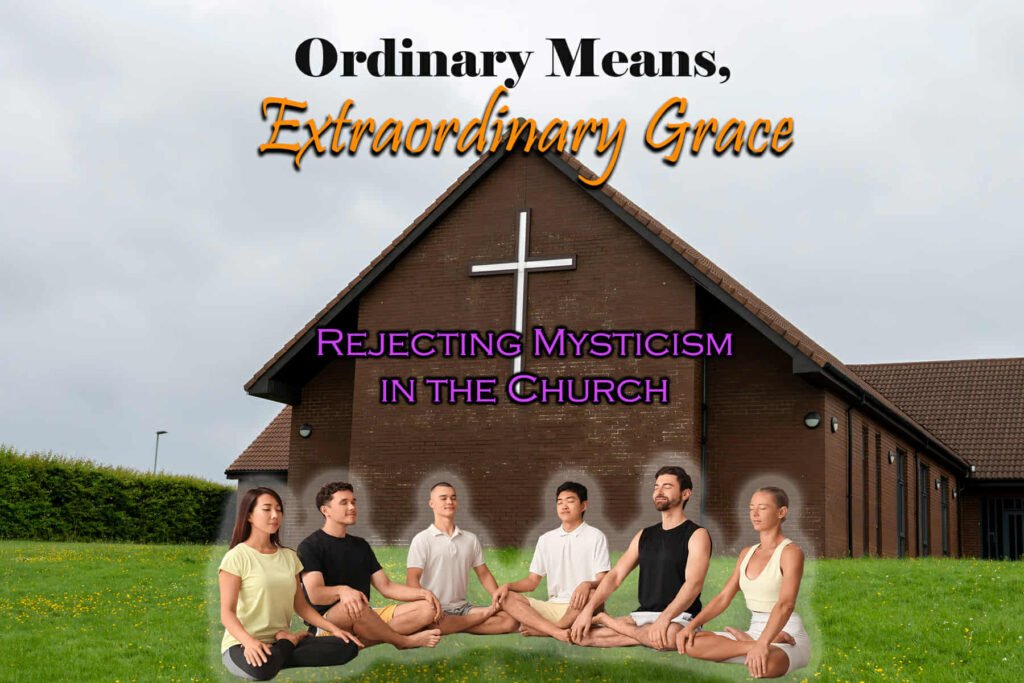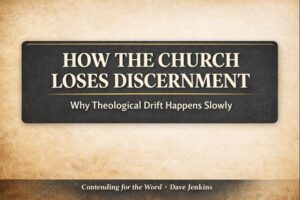⏱️ Estimated Reading Time: 6 min read
Mysticism and the Authority of Scripture: Why the Word is Enough
By Dave Jenkins · Featured in the Fall 2025 Issue of Theology for Life Magazine
Scripture is sufficient and authoritative for life and godliness. We live in an age of spiritual restlessness. Many professing Christians long for something more, something deeper, mysterious, and seemingly transformative. This has fueled a resurgence of mystical practices, contemplative prayer, monastic silence, labyrinth walks, and even New Age inspired tools like the Enneagram. But here is the vital question, is the Word of God enough. The Bible answers with a resounding yes.
In 2 Timothy 3:16–17, Paul writes that, “All Scripture is breathed out by God and profitable for teaching, for reproof, for correction, and for training in righteousness, that the man of God may be complete, equipped for every good work.” The inspired Word of God is sufficient, complete in itself to equip the believer for every good work. Mysticism in contrast whispers that Scripture is not enough. It suggests that true spirituality requires an “experience” beyond the Word. This is not the path of biblical Christianity.
Defining Mysticism and Its Appeal
Mysticism is notoriously slippery to define, but at its core, it seeks direct, unmediated experience of God apart from His Word. Historically, it arose in the early monastic movement. Desert fathers in the third and fourth centuries sought solitude, silence, and inner visions. Medieval mystics like Teresa of Ávila and Meister Eckhart emphasized inner experiences of the divine more than Scripture’s clear testimony.
Today, the names have changed but the pull is the same. Richard Foster’s Celebration of Discipline popularized contemplative practices drawn from Catholic mysticism. Dallas Willard’s Spirit of the Disciplines suggested a similar turn. John Mark Comer’s recent advocacy of silence and solitude borrows from these same traditions.
Why is this attractive. In a noisy, distracted, and secular age, people crave meaning. Mysticism promises intimacy with God through “techniques,” whether “breath prayers,” Lectio Divina, or “listening prayer.” Notice how authority shifts from the objective Word of God to subjective experience. That is dangerous ground.
The Authority and Sufficiency of God’s Word
The Reformation stood or fell on Sola Scriptura, Scripture alone as the final authority. Psalm 19 celebrates the perfection and sufficiency of God’s Word, “The law of the Lord is perfect, reviving the soul, the testimony of the Lord is sure, making wise the simple” (v. 7). Hebrews 4:12 describes the Word as “living and active, sharper than any two edged sword.”
God has not left His people wandering in darkness, guessing at His will. As Peter declares, “His divine power has granted to us all things that pertain to life and godliness, through the knowledge of him” (2 Peter 1:3). Everything we need to know God, walk with Him, and grow in holiness is revealed in Scripture. Experience is not bad in itself. The psalmists often speak of tasting and seeing the goodness of the Lord (Psalm 34:8). But our experiences must always be interpreted, tested, and governed by the Word. Otherwise, we elevate feelings above God’s revelation.
Where Mysticism Goes Wrong
Mysticism makes inner impressions authoritative. Instead of asking, “What does God’s Word say,” the mystic asks, “What did I feel in prayer.” This subtle shift replaces the voice of God in Scripture with the voice of one’s own heart. Jeremiah 17:9 warns, “The heart is deceitful above all things, and desperately sick, who can understand it.”
Doctrinal Drift
Mystics frequently downplay sin, the Cross, and justification by faith alone. In Teresa of Ávila’s visions, the centrality of Christ’s atoning work is often blurred. Modern contemplatives rarely emphasize repentance or the exclusivity of Christ.
Confusion of the Means of Grace
The ordinary means of grace, preaching of the Word, prayer, sacraments, and fellowship, become overshadowed by techniques like centering prayer or mantras. These practices mimic Eastern meditation more than biblical prayer. Jesus warned in Matthew 6:7 against “heaping up empty phrases as the Gentiles do.”
The Apostle Paul confronted similar errors in Colossians 2, where false teachers promoted ascetic practices and visions. He exhorted believers, “Let no one disqualify you, insisting on asceticism and worship of angels, going on in detail about visions, puffed up without reason by his sensuous mind” (Colossians 2:18). Mysticism is not new, it is a recycled error.
Standing Firm on the Word in a Mystical Age
The way forward is not mystery, but clarity, not chasing hidden techniques, but holding fast to God’s sufficient revelation. The Reformers insisted that Scripture is clear and complete. John Calvin wrote in his Institutes, “The Word of God is the fountain of all wisdom, affording the only sure rule for the guidance of our life.”
Charles Spurgeon likewise urged, “Visit many good books, but live in the Bible.” J. C. Ryle reminded believers that it is not visions or impressions that sanctify, but the Spirit working through the Word.
The ordinary means of grace may not feel as exciting as mystical practices, but they are God’s appointed path for His people. Hearing the Word preached, praying according to Scripture, receiving the sacraments, and walking with the saints, these are the ways God conforms us to Christ.
Practical Counsel for the Church
- Test all things by Scripture. “Test everything, hold fast what is good” (1 Thessalonians 5:21). No practice or teaching is above examination by the Word.
- Teach discernment. Pastors and teachers must equip God’s people to recognize and reject mystical distortions.
- Anchor assurance in Christ. Our confidence is not in subjective impressions but in Christ’s finished work.
- Cultivate deep Scripture reading. Encourage slow, thoughtful reading of the Bible itself. True meditation fills the mind with God’s Word (Joshua 1:8), not emptying it.
In Summary: The Word Is Enough
In every generation, mysticism tempts the church to look beyond God’s Word. To do so echoes the serpent’s question in the garden, “Did God really say.” The good news is that God has spoken finally, sufficiently, and authoritatively in His Son (Hebrews 1:1–2), and in the Scriptures that bear His Spirit’s breath. We do not need mystical techniques to know God. We need Christ, as He is revealed in His Word.
So, dear Christian, take up and read the Word, feast on it, and trust that when you open your Bible, you are hearing the voice of the living God. That is enough.
For Further Study
- Dave Jenkins, The Word Explored
- Justin Peters, Do Not Hinder Them
- John Owen, Communion with God
- J. C. Ryle, Practical Religion
This article appears in the Fall 2025 Issue of Theology for Life Magazine, exploring “The Means of Grace.”

Ordinary Means, Extraordinary Grace: Rejecting Mysticism in the Church
Dave Jenkins is happily married to his wife, Sarah, and lives in beautiful Southern Oregon. He is a writer, editor, and speaker who loves Christ, His people, the Church, and sound theology.
Dave serves as the Executive Director of Servants of Grace Ministries and the Executive Editor of Theology for Life Magazine. He is the Host and Producer of the Equipping You in Grace Podcast and a contributor to and producer of Contending for the Word.
He is the author of The Word Explored: The Problem of Biblical Illiteracy and What To Do About It (House to House, 2021), The Word Matters: Defending Biblical Authority Against the Spirit of the Age (G3 Press, 2022), and Contentment: The Journey of a Lifetime (Theology for Life, 2024).
You can connect with Dave on Facebook, X (Twitter), Instagram, YouTube, or subscribe to his newsletter.
When he is not engaged in ministry work, Dave enjoys spending time with his wife, going to movies, sharing a meal at a favorite restaurant, or playing a round of golf with friends. He is also a voracious reader, particularly of Reformed theology and the Puritans, and is often found working through a stack of new books from a wide range of Christian publishers.
Dave earned his M.A.R. and M.Div. from Liberty Baptist Theological Seminary.




